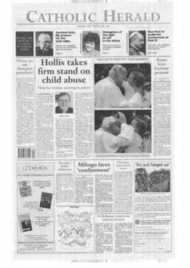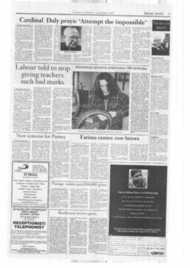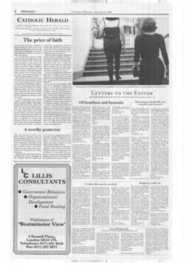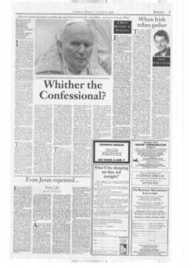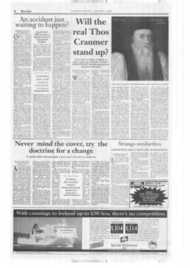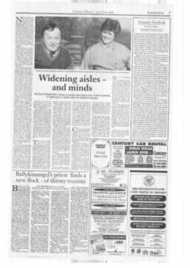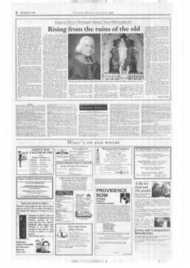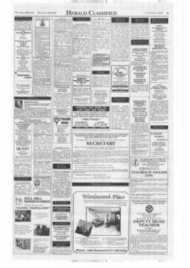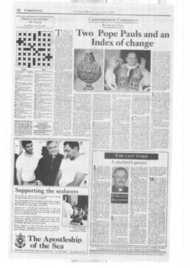Page 7, 14th June 1996
Page 7
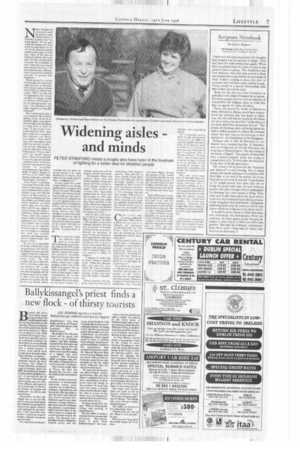
Report an error
Noticed an error on this page?If you've noticed an error in this article please click here to report it.
Tags
Share
Related articles
Catholic Groups Back Disabled Bill
Andrew Robertson Looks At The Obstacles Disabled People...
Ramp That Welcomes Disabled To Parish Community
Practical Campaigner For The Disabled
What Are The Differences?
Widening aisles and minds
PETER STANFORD meets a couple who have been in the forefront of fighting for a better deal for disabled people
NANCY ROBERTSON is worried in case I am going to make Church Action on Disability (Chad) sound "too fuddy-duddy". We are chatting in the sitting room of her north London home at the end of our interview and her remark comes right out of the blue. After all she and her husband Andrew have just spent an hour reeling off an impressive list of examples of how Chad has encouraged and cajoled churches of all denominations into offering a better practical and spiritual welcome to people with disabilities.
When pressed to explain her fear, she cites what some might perceive, in the frenzied pressure group climate of the 1990s, as a lack of radicalism. "We're not the sort of organisation that chains ourselves to railings outside the Houses of Parliament to get our message across," she says, "and therefore some might regard us as a bit oldfashioned".
Now I understand what is concerning her. We had been talking earlier about those disability-rights campaigners who recently hit the headlines by lying down in front of buses. In fact it was I who mentioned how little their high-profile antics seemed to have achieved, and Nancy and Andrew both wheelchair users throughout their adult lives because of polio who politely defended the passion and gusto behind such protests. "It's just that I can't see myself joining them," Nancy had admitted, her gentle laugh and constant understatement deflecting attention away from her own lifetime of successful campaigning into the achievements of others. "Except in defence of the NHS. Any threat to scrap that, and even I would have to be there."
Saint Paul's Cathedral, Christopher Wren's late-17thcentury masterpiece whose dome dominates the London skyline, is on a par with the Palace of Westminster as national monuments go, but when Nancy and Andrew and fellow members of Chad gather there next Tuesday, there won't be any chains or caterwauling, but rather a celebration. Chad, chaired by Nancy until she stepped down recently, is marking the culmination of a three-year, City-funded study of access provision in the capital's churches with an ecumenical act of worship in a building that until very recently symbolised the physical exclusion of disabled people from houses of God.
"It used to be impossible for access with all those steps up to the front," says Andrew, his lilting Scottish accent only slightly dimmed by a lifetime working and raising a family down south. "We just couldn't have got in. But now there is a side door where you can summon a lift to take you up and inside. I know some disabled people will still be disappointed that you have to ring a bell and wait for someone to organise the lift for you, but frankly with a building that old there are always going to be some drawbacks to access. And when you get inside, they've done a wonderful job."
it wasn't always thus, either in Saint Paul's or your average parish church, as Andrew and Nancy can recall. When they decided to get married almost four decades ago, they had to search hard for a church that not only matched their own middle-of-the-road Anglican beliefs, but one which was accessible and more importantly, had an aisle wide enough to accommodate their wheelchairs side by side in the triumphant procession back from the altar, past some of the people who had no doubt questioned their wisdom in going ahead at all.
THEY MANAGED TO find one, and have since gone on to see their own pioneering determination back in the 1950s to live fulfilled and independent lives together, whatever the obstacles created by disability, reproduced many times over.
It was at times, they now admit, a lonely and a tough struggle, without any of the rights and supports that are today available many the result, at least in part, of their campaigning. But as they enjoy an extremely active retirement, they both rejoice in the good fortune of a younger generation and the progress that has been made.
The churches, Nancy and Andrew agree, have not always managed to keep up to speed with that progress. Little things continue to niggle. Some parishes, for instance, have large print hymn-books for those with bad eyesight, yet often they are kept locked away rather than freely available in the porch. Others have ramps but then do not involve disabled members of the congregation as wardens or readers.
And the day-to-day questions lead on to bigger issues. Why, for instance, are there so few disabled people in the ordained ministry? And why does discussion of disability and the churches never move beyond the question of access? Is the discrimination and marginalisation still experienced by many people with disabilities not as much a moral issue demanding the concern and campaigning skills of church leaders as, say, poverty or abuse of refugees?
"I suppose it's rather like doctors," Andrew remarks wryly. "When they discover they can't cure you, they switch off. Church leaders can't see a straightforward solution, so they stay away
from the subject of disability)).
Nancy searches for the good but not at the cost of overlooking some negative aspects. "You will find in every church a basic kindness, but that can lead to disabled people being regarded as `poor' souls in need of sympathy and attention. I don't want to sound as if I'm criticising, but that isn't enough. What Chad is about is getting to the point where everyone who wants to, regardless of their disability, can take as full a part in church life, and beyond that in everyday life, as they want."
CHAD IS NOT, they recognise, politically correct. "We've always believed the best way is to educate and encourage people along with you," says Nancy. "And I'm afraid I can't get worked up about language that excludes wheelchair users".
At this point I confess to a terrible lack of understanding because I cannot think of a single example of such phraseology. Nancy put me in the picture. "It's things like hymns that start "Stand up, stand up for Jesus". Some people say 'we can't stand up, so don't use it'."
Even if they are not about to embark on yet another rewriting of the hymnals, the leaders of the various churches have at least been showing a greater willingness to listen to Chad of late. Last month there was a meeting with senior figures through the auspices of the Council of Churches for Britain and Ireland. And one success of the current Chad Greater London initiative has been the involvement of the blackled churches and their leaders.
Nancy Robertson is hopeful that these low-key stirrings will bear fruit. And her instincts about getting the great and good involved have proved right in the past. She was able as Executive Director of his Advisory Group Disability to encourage the Prince of Wales to devote his energies to the cause. And since her retirement from that post in 1993, she has remained active with many charities and campaigning groups.
She is typically modest about all such achievements which led to an MBE last year, and equally reluctant to boast of the progress made by Chad since it was set up nine years ago in the wake of the International Year of Disabled People. "Success will be when we have raised awareness to such an extent in all the churches, in the theological colleges and among the hierarchies, that we have done ourselves out of business."
That may yet be some time off. But while Nancy has handed on the baton to a new young chairman who is currently studying at theological college, her seasoned campaigning instincts will not allow her to slip away into the night. She remains a trustee of Chad and along with Andrew one of the most admired, respected and sought-after voices, chains or no chains, among those working with people with disabilities.
Chad can be contacted on 01647 281259 or on 0181 985 3150. Peter Stanford is chairman of the national spinal injuries charity, Aspire
blog comments powered by Disqus


